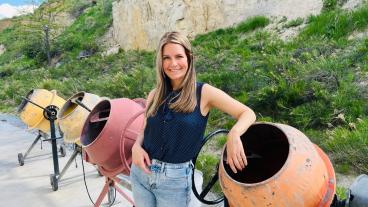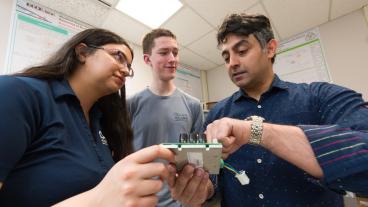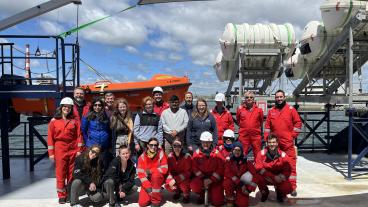A Colorado School of Mines professor has been awarded $1.5 million in funding from the U.S. Department of Energy for advanced technology solutions for unconventional oil and gas development.
Carolyn Koh, William K. Coors Distinguished Chair of Chemical and Biological Engineering and director of the Center for Hydrate Research, is the lead investigator on the three-year project, one of six nationwide to receive funding through the Office of Fossil Energy program.
“The grant allows us to look at robust coatings for pipeline plugging prevention,” Koh said.
Koh’s research team will collaborate with Oceanit, a Honolulu-based science and engineering company, to develop a coating that can be applied to pipelines in situ. The coating will be designed to mitigate hydrate deposit formation along pipeline walls, which in turn will prevent critical blockage of the pipes.
Not unlike arterial clogging in the human body, gas hydrates are problematic for flow assurance programs in the oil and gas industry. Given proper thermodynamic and flow conditions, these crystalline solids of water and light hydrocarbons can form in pipelines and, in particular, accumulate at the inner wall of pipes. If enough hydrates form, they can completely block the flow, potentially damaging the pipeline.
Finding a coating that can be applied in situ could mean large savings on operating expenditures for oil and gas companies, Koh said. Since the coatings work even on already corroded pipelines, companies would not have to spend money on pipeline replacement.
The project builds on work funded by an earlier DOE grant, in which Koh’s team was able to show that coatings from Oceanit worked to prevent hydrate formation. That work was conducted at the lab-bench scale; the end goal of this newly funded research, however, is to transition into a multiphase-pilot scale and eventually a field-scale study.
Koh’s research team is implementing a “flow loop” in the Center for Hydrate Research to simulate a flowing system. Marshall Pickarts, a first-year PhD student in chemical engineering, is working with the flow loop. The team, with the help of Mike Stadick, laboratory coordinator for the Chemical and Biological Engineering Department, recently added an extension to the loop to help amplify the pressure drop throughout the system.
Ahmad Majid, a postdoctoral researcher who completed his PhD in the Center for Hydrate Research and was awarded the Best Doctoral Thesis in Flow Assurance award at the 2017 International Conference on Gas Hydrates, helped with the design of the flow loop. Hao Qin, a fourth-year PhD student, is developing a mathematical model to aid in the understanding of how hydrates form on the pipe wall. The model will be coupled with OLGA, a dynamic multiphase flow simulator that is commonly used in the oil and gas industry.
CONTACT
Katharyn Peterman, Student News Reporter | kpeterma@mymail.mines.edu
Emilie Rusch, Public Information Specialist, Colorado School of Mines | 303-273-3361 | erusch@mines.edu



